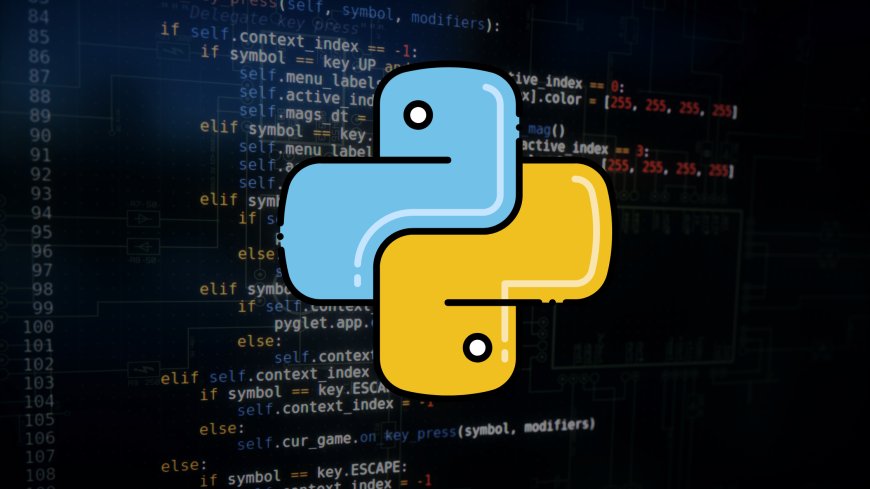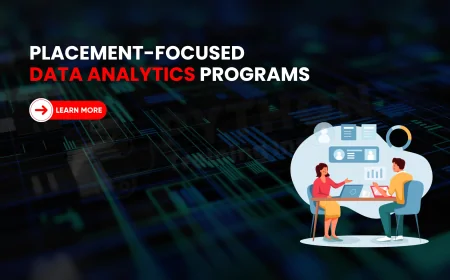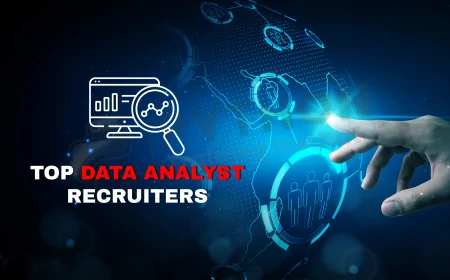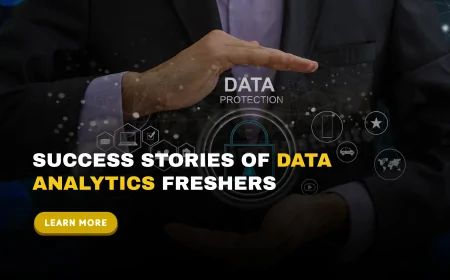Why Python is the Most Demanded Programming Language in 2025
Discover why Python remains the most demanded programming language in 2025. Explore its features, career scope, industry adoption, and why it's perfect for beginners and professionals.

Introduction
In 2025, the technology landscape is evolving faster than ever. Amidst the buzz around AI, Machine Learning, Blockchain, and Automation, Python stands tall as the most demanded programming language across industries. Whether you are a beginner exploring coding, an experienced developer, or someone pivoting into tech fields like AI, data science, or cloud computing — Python is everywhere.
But why is Python so popular?
What makes it the first choice for developers, companies, and tech startups even after decades of existence?
This article dives deep into why Python is the most demanded programming language in 2025 and why learning it is an investment in your future.
What is Python?
Python is an interpreted, high-level, general-purpose programming language created by Guido van Rossum and released in 1991. Designed for readability and simplicity, Python allows developers to express concepts in fewer lines of code compared to other languages like Java or C++.
Python supports multiple programming paradigms:
-
Procedural programming
-
Object-oriented programming
-
Functional programming
It has a massive ecosystem of libraries and frameworks, making it ideal for diverse applications from simple scripting to advanced Artificial Intelligence (AI) systems.
The Rise of Python: A Quick Look at Statistics
-
According to the TIOBE Index 2025, Python holds the #1 position as the most popular programming language.
-
In a survey by Stack Overflow 2025, Python was the most loved and wanted language for the sixth consecutive year.
-
LinkedIn data shows a 50% increase in job postings requiring Python skills compared to 2023.
-
Google Trends reflects that "Learn Python" continues to be one of the most searched tech-related queries globally.
Clearly, Python isn’t just a trend — it’s a powerful, sustainable skill shaping the future of technology.
Why Python is the Most Demanded Programming Language in 2025
Let's break down the core reasons:
1. Simplicity and Readability
Python’s syntax is clean, intuitive, and close to the English language.
This reduces the learning curve for beginners and boosts productivity for experienced developers.
Example:
Writing "Hello, World!" in Python requires just a single line:
2. Versatility Across Domains
Python is not limited to web development or app building. It powers a vast range of industries:
-
Artificial Intelligence and Machine Learning
-
Data Science and Analytics
-
Cybersecurity and Ethical Hacking
-
Web Development (Django, Flask)
-
IoT and Automation
-
Game Development (Pygame)
No other language offers such multi-domain flexibility.
3. Strong Community Support
Python boasts one of the largest developer communities globally.
This means:
-
Faster problem-solving
-
Tons of free resources
-
Endless tutorials, courses, and mentorship programs
In 2025, community-driven development keeps Python ahead of emerging languages.
4. Extensive Libraries and Frameworks
Python’s rich ecosystem of libraries makes development faster and more efficient.
Top Libraries:
-
Pandas, NumPy (Data Science)
-
TensorFlow, PyTorch (AI/ML)
-
Flask, Django (Web Development)
-
OpenCV (Computer Vision)
-
Scikit-Learn (Machine Learning)
Using these libraries, developers can build sophisticated solutions in minimal time.
5. Python for Artificial Intelligence and Machine Learning
AI and ML are no longer futuristic — they are today’s reality.
Python leads this revolution by being the #1 choice for AI developers.
-
Easy syntax for writing complex algorithms
-
Deep learning frameworks (like TensorFlow) have Python APIs
-
Preferred for research and development in AI
Fact:
90% of AI research papers published in 2024 used Python as their primary programming language.
6. Career Opportunities and High Salaries
Python developers are highly paid across the globe.
Average Salary for Python Developers in India (2025 Trends):
-
Entry-level Python Developer: ₹6–8 LPA
-
Mid-level Developer: ₹12–18 LPA
-
Senior Python Engineer (AI/ML Focus): ₹25–40 LPA
Top Hiring Companies:
-
Google
-
Amazon
-
Microsoft
-
IBM
-
TCS
-
Infosys
-
Startups and Fintechs
Python skills make you eligible for various roles like AI Engineer, Data Scientist, Web Developer, Automation Tester, and more.
7. Python in Education and Academia
Python is now the default teaching language for Computer Science courses in top universities worldwide.
-
Harvard’s CS50 (Intro to Computer Science) now uses Python
-
IITs and NITs in India have incorporated Python as a mandatory subject
-
CBSE (India’s leading school board) introduced Python from class 11 onwards
This academic push ensures that new generations are Python-ready from an early age.
8. Python’s Role in Startups and Innovation
Python’s speed of development makes it perfect for startups where time-to-market is crucial.
Startups in fintech, healthcare tech, edtech, and AI innovation rely on Python for building MVPs and scaling products.
Example:
Instagram, Spotify, Uber, Dropbox — all started or scaled parts of their architecture using Python.
Python Career Roadmap in 2025
Beginner Roadmap:
-
Learn Python basics (Syntax, Variables, Data Types)
-
Understand Object-Oriented Programming
-
Practice Data Structures and Algorithms
Intermediate Roadmap:
-
Master Python Libraries (Pandas, NumPy)
-
Build projects (Web Apps, Data Dashboards)
-
Start learning Web Frameworks (Django, Flask)
Advanced Roadmap:
-
Dive into AI, ML, Deep Learning
-
Master Data Visualization (Matplotlib, Seaborn)
-
Contribute to Open-Source Projects
-
Prepare for Certifications (PCEP, PCAP, CEPP)
Industries Using Python in 2025
-
Healthcare – Predictive diagnosis, medical imaging
-
Finance – Fraud detection, algorithmic trading
-
E-commerce – Recommendation engines
-
Automobile – Autonomous vehicle programming
-
Education – Personalized learning platforms
-
Cybersecurity – Threat detection and ethical hacking tools
-
Entertainment – Content recommendations, game development
Python’s application breadth guarantees continuous demand across diverse sectors.
Future Trends of Python (2025–2030)
-
Python + AI – Building autonomous systems and generative AI tools
-
Quantum Computing – Python APIs for quantum programming (Qiskit)
-
Cybersecurity – Python-based threat detection models
-
Blockchain – Smart contract development with Python libraries
-
Edge Computing – Lightweight Python applications for IoT devices
Python’s adaptability ensures it will stay relevant for decades to come.
Top Reasons to Learn Python in 2025 (Quick Summary)
-
Easy to learn and beginner-friendly
-
Massive career opportunities
-
Ideal for AI, Data Science, Web Development
-
Huge community support and resources
-
Future-proof and globally recognized skill
Conclusion
Python is not just a programming language — it’s the foundation of the digital future.
In 2025, Python continues to dominate because of its simplicity, versatility, power, and community strength. Whether you're aiming for a career in AI, Data Science, Web Development, Cybersecurity, or Automation, Python opens the door to countless possibilities.
If you are serious about a career in tech, learning Python is the smartest move you can make today.
The world is coding its future in Python — it’s time you do too!
FAQ's
1. Why is Python the most demanded programming language in 2025?
Answer: Python’s simplicity, versatility across AI, data science, web development, and its huge library ecosystem make it the most demanded programming language in 2025.
2. Is Python still worth learning in 2025?
Answer: Absolutely! Python’s applications in AI, machine learning, cloud computing, cybersecurity, and automation ensure its relevance and high demand in 2025 and beyond.
3. What industries are hiring Python developers in 2025?
Answer: Industries such as healthcare, finance, e-commerce, cybersecurity, entertainment, education, and automotive are actively hiring Python developers.
4. How much salary can a Python developer expect in India in 2025?
Answer: In India, an entry-level Python developer can expect ₹6–8 LPA, while experienced professionals can earn ₹18–40 LPA, depending on specialization.
5. Which fields use Python the most in 2025?
Answer: Fields like Artificial Intelligence, Data Science, Web Development, Cloud Computing, Automation, and Cybersecurity use Python extensively in 2025.
6. Is Python good for AI and Machine Learning?
Answer: Yes, Python is the top choice for AI and ML due to its libraries like TensorFlow, PyTorch, and Scikit-Learn, making model development efficient and powerful.
7. Can Python be used for cybersecurity and ethical hacking?
Answer: Definitely! Python is widely used for building cybersecurity tools, penetration testing frameworks, and automating security tasks in ethical hacking.
8. How long does it take to learn Python in 2025?
Answer: With consistent effort, basic Python skills can be learned in 3–6 months, while mastering it for AI, data science, or web development may take 6–12 months.
9. Is Python beginner-friendly?
Answer: Yes! Python’s clean syntax, similar to English, makes it the easiest and most recommended language for beginners starting their coding journey.
10. What are the top libraries of Python in 2025?
Answer: Top Python libraries include TensorFlow, PyTorch, Pandas, NumPy, Scikit-Learn, Django, Flask, OpenCV, and FastAPI.
11. Can I get a remote job with Python skills?
Answer: Yes, Python developers are in high demand for remote jobs, especially in fields like data science, web development, AI engineering, and automation.
12. Which companies are hiring Python developers in 2025?
Answer: Top companies hiring Python developers include Google, Amazon, Microsoft, Facebook, Infosys, TCS, Accenture, and leading tech startups worldwide.
13. What certifications are best for Python developers?
Answer: Certifications like PCEP (Certified Entry-Level Python Programmer), PCAP (Certified Associate), CEPP (Certified Expert) boost a Python developer’s credibility.
14. Is Python only used for data science?
Answer: No. While Python is powerful for data science, it is also extensively used in web development, AI, game development, automation, networking, and IoT.
15. How does Python compare to JavaScript in 2025?
Answer: Python is better for AI, data science, and backend development, while JavaScript dominates in frontend web development. Both have massive demand.
16. What is the future of Python after 2025?
Answer: Python’s role will expand further into quantum computing, edge AI, cybersecurity, IoT, and sustainable technologies, securing its future well beyond 2025.
17. Should I learn Python before AI and Data Science?
Answer: Yes! A strong foundation in Python is crucial before diving into AI, machine learning, or data science because most tools and frameworks are Python-based.
18. Which Python framework is best for web development in 2025?
Answer: Django and Flask remain the best Python frameworks for web development due to their flexibility, scalability, and vibrant community support.
19. Is Python enough to get a job?
Answer: Python, along with a good understanding of problem-solving, DSA (Data Structures and Algorithms), and basic domain skills (like web or AI), is enough to get a good job in 2025.
20. Why do startups prefer Python in 2025?
Answer: Startups prefer Python because it enables rapid prototyping, cost-effective development, easy scalability, and access to a large pool of developers and libraries.
What's Your Reaction?
 Like
0
Like
0
 Dislike
0
Dislike
0
 Love
0
Love
0
 Funny
0
Funny
0
 Angry
0
Angry
0
 Sad
0
Sad
0
 Wow
0
Wow
0















